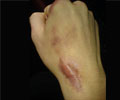The promising findings of a new study have recommended the implantation of lenses made of a collagen-like substance for people with nearsightedness.
"Laser-assisted in-situ keratomileusis (LASIK) has gained widespread popularity as a safe and effective surgical method for the correction of myopia, but patients with high [severe] myopia or thin corneas face some restrictions in avoiding the risk of developing keratectasia [a weakening of the cornea]," the authors write as background information in the study paper, published in the Archives of Ophthalmology, one of the JAMA/Archives journals.To overcome these disadvantages, they say, an implantable lens consisting of a biocompatible collagen copolymer was developed, and it appears to be effective in correcting moderate to severe vision problems.
According to them, the implantation procedure is largely reversible, and the lens is interchangeable, unlike LASIK.
Dr. Kazutaka Kamiya of the University of Kitasato School of Medicine, Kanagawa, Japan, has revealed that to assess the long-term clinical outcomes of the lens implantation, the research team evaluated 56 eyes of 34 patients who underwent implantation of the collagen copolymer lens.
Routine post-operative examinations were conducted one, three and six months and one, two and four years later.
At four years after surgery, 44 of the eyes (79 percent) were within 0.5 diopter (unit of measuring lens power) of the targeted correction and 52 (93 percent) were within one diopter.
Advertisement
"To our knowledge, this is the longest study to assess the refractive outcomes and adverse events (of the collagen copolymer lens implantation for myopia).
Advertisement
The authors note that their findings suggest that collagen copolymer lens implantation "may be a good alternative for the treatment of moderate to high myopia. More prolonged careful observation for longer than four years is necessary to assess late-onset complications of this surgical technique."
Source-ANI
TAN












